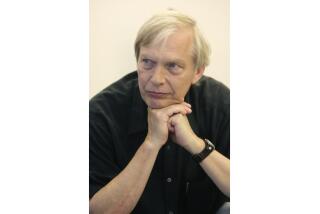Analysts See Edwards as a Strong Contender in 2008
- Share via
Even as the 2004 presidential campaign was ending, John Edwards sought to plant the seeds of a new beginning.
“I want to talk to the tens of millions of people who worked alongside us, who believed in our cause and who stood with us,” the Democratic vice presidential candidate told a tearful Boston crowd Wednesday, as he and Sen. John F. Kerry conceded defeat in the presidential race. “You can be disappointed, but you cannot walk away. This fight has just begun.”
He remains a fresh-faced 51. And though his career as a North Carolina senator ends with the new year, he is viewed as a top contender for his party’s presidential nomination in 2008.
But a key question surrounds him: What can Edwards do to remain politically viable as a private citizen until it’s time to run again?
“He somehow has to stay relevant and add to his credentials and not fade away,” said Stuart Rothenberg, publisher of a nonpartisan political newsletter in Washington. “Over the next two years, other politicians will be in the news; they’ll be offering their own agendas. If you’re out of government, who cares about yours?”
History is both a bane and a comfort to Edwards, whose populist message and optimistic attitude won him notice during his unsuccessful bid for the Democratic presidential nomination. His unexpectedly strong showing in the primaries paved the way for Kerry to select him as his running mate.
On the one hand, since the advent of the modern two-party system, no losing vice presidential candidate other than Franklin D. Roosevelt has come back to occupy the Oval Office. The list of those who have fallen short includes Democrats Edmund Muskie, Walter F. Mondale and Sen. Joe Lieberman of Connecticut and Republicans Dan Quayle and Bob Dole.
But there have been politicians who have left office, managed to stay in the spotlight and gone on to become their party’s standard-bearer. In recent times, the most obvious example is Ronald Reagan.
After his second term as California’s governor ended in 1974 and his 1976 bid for the GOP presidential nomination fell short, Reagan traveled the country extensively, giving speeches and campaigning on behalf of other Republican candidates. He kept his name in the newspapers and on television and piled up chits for later use.
“His movement forward was unmistakable,” said Jeffrey Berry, professor of political science at Tufts University in Medford, Mass.
And in 1980, he won the GOP’s presidential nomination.
Berry said Edwards’ biggest challenge would be adding to his relatively short resume (one term as senator) and bulking up his foreign policy experience.
Rothenberg suggested Edward chair the Democratic National Committee: “It wouldn’t be bad to try to emerge as the Democratic spokesman criticizing the Republican agenda.”
But Edwards must deal with difficult personal matters next. His wife, Elizabeth, was diagnosed this week with breast cancer. The Edwards family left Boston on Wednesday and are at home in Washington weighing her treatment options.
“He’s not thinking about politics now at all,” said former campaign manager Peter Scher. “He’s really just thinking about the family. His only focus is Elizabeth’s health.”
Harrison Hickman, a longtime Edwards friend and pollster, said the family is resilient and optimistic. Edwards’ 1998 run for the Senate sprang from the death of his 16-year-old son two years earlier.
“It is not something you would want to be good at, but they have a remarkable facility for dealing with what would be debilitating circumstances for most people,” Hickman said. “I say that about both Elizabeth’s illness and losing a campaign. He put it to me very clearly when he first ran for Senate: They’ve been through the worst anyone could possibly go through when they lost Wade.”
Hickman thinks Edwards will likely make another run for president, because nothing has changed “to make the issues that compelled him to run any less compelling.”
Although Elizabeth Edwards’ cancer has driven politics from her husband’s mind for the time being, Hickman said, it highlights his reasons for seeking higher office.
“Elizabeth gets this diagnosis, and they can have any healthcare [option] they want,” Hickman said. “It’s not something that’s available to most people. The sense that everybody should have the highest quality healthcare available ... that’s one example of the kind of thing that really drives him.”
More to Read
Get the L.A. Times Politics newsletter
Deeply reported insights into legislation, politics and policy from Sacramento, Washington and beyond. In your inbox twice per week.
You may occasionally receive promotional content from the Los Angeles Times.











